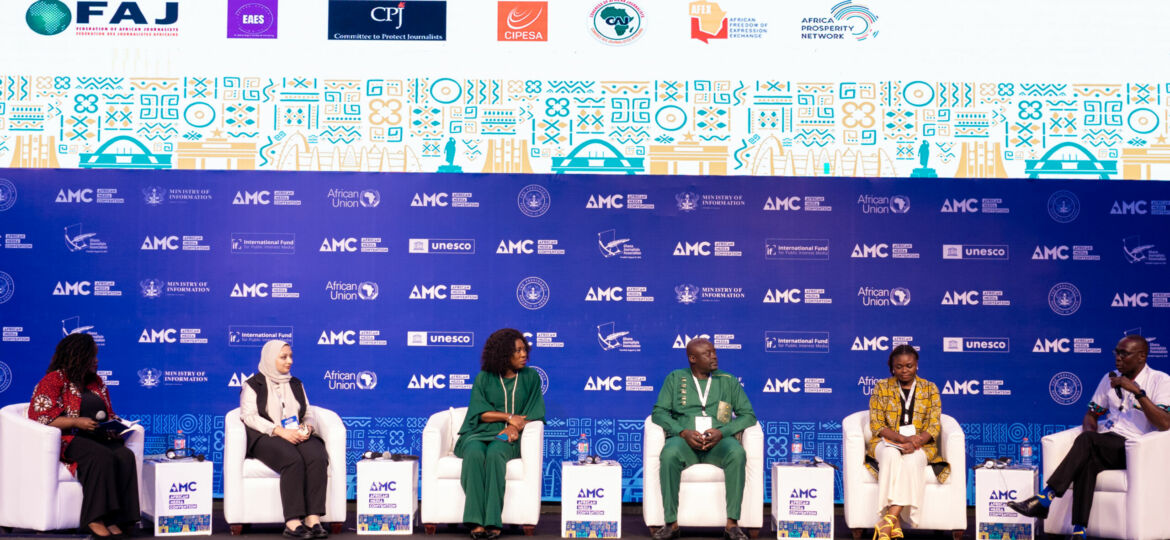
Ghana| HRNJ-Uganda| Artificial Intelligence (AI), Environmental Conservation, and addressing misinformation in news reporting, were the three subjects that dominated the 3rd Africa Media Convention, held in Accra, Ghana between 15th and 17th, May 2024.
Attended by over 500 African editors, journalists, and media stakeholders, the AMC24 under the theme “The Africa We Want: Enhancing Freedom, Innovation, and Sustainability in a Dynamic Media,” was graced by varied high-profile dignitaries. These included Leslie Richer, the director of information and communication, at the African Union Commission, Dr. Rita Bissoonauth, the director of UNESCO, Addis Ababa Liaison, Churchill Otieno, the president of Africa Editors’ Forum also Chairman of Africa Media Convention, Fatimatu Abubakar, the Minister of Information Designate in Ghana.
At this 2-day event, Uganda was represented by Robert Ssempala, the Executive Director, HRNJ-Uganda, Godfrey Kabyanga, the Minister of State for ICT and National Guidance, and Daniel Kalinaki, the president of Eastern Africa Editors’ Society who said non-prominence of African story in Africa’s media on reluctance of both journalists and editors.
In his opening remarks, Africa Editors’ Forum president tasked African media practitioners to use the potential of Artificial Intelligence (AI) to revolutionize the continent’s media landscape.
“As African media professionals, we must engage critically with AI, ensuring that ethical principles, transparency, and accountability guide its development and deployment. By harnessing the power of AI responsibly, we can unlock new opportunities for innovation, improve the quality of journalism, and advance media freedom and sustainability across the continent.” Otieno said
He urged African editors to become custodians of African narrative/story, upholding the truth about Africa, defending media freedom, driving sustainability, and evolving homegrown media policies that can ensure that media freedom thrives.
“In the face of unprecedented challenges; censorship, harassment, and rampant spread of misinformation, we must harness the power of creativity and innovation to sustain a free and vibrant media.” Otieno said, “We must embrace new technologies, explore innovative storytelling methods, and forge partnerships that amplify the voices of the voiceless and ensure that truth prevails.”
Leslie underlined the vital role of media literacy in journalism. She said that “media literacy is not just about understanding how to use various forms of media, but also about analyzing, evaluating, and creating relevant messages to promote action and impact.”
If media literacy is effectively imparted to journalists, Leslie asserted that it can go a long way in averting the spread of “misinformation and disinformation,” calling for collaborated efforts to promote it across Africa.
UNESCO’s Dr. Bissoonauth urged all African journalists to acquire the skill of collectivism, which she believes to be a big pillar in shaping the media space.
“UNESCO recognizes that the media’s goal is far beyond reporting news, it is about nourishing, informing, and engaging societies. It is about holding power to account, but most importantly, it is about shaping the future for responsible and innovative storytelling. This convention offers us a unique platform to address the multi-fasting challenges and collaborate to promote coverage that will enhance the resilience and sustainability of media in Africa.”
Addressing the convention, minister Kabyanga reaffirmed Uganda’s dedication to continue upholding media freedoms. He revealed that the Government is revisiting communication “policies to ensure they remain relevant and effective in the digital age” considering the “rapid technological advancements that are reshaping the media industry.”
HRNJ-Uganda’s Robert Ssempala commended organizers of AMC, saying that it is a “fast-growing and influential platform that in all certain terms will foster a great focus on telling of African story through our innovations to address the African question of press freedom.”
